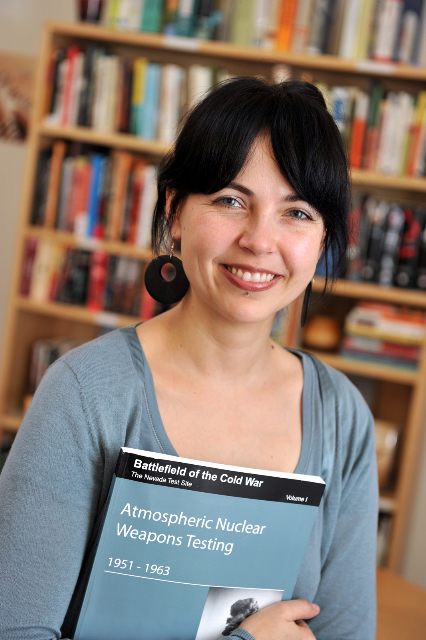Professor’s Writings Explore Landscape and Life in Nevada
April 2010

English lecturer Autumn Watts read from and
discussed her novel-in-progress, “A Great and Terrible
Light.”
An enduring fascination with the Southwest United States, and its dreadful legacy of atomic bomb-testing legacy, inspired WCMC-Q English lecturer Autumn Watts to base many creative writing and interactive media projects on the region. For her contribution to the college’s April Literary Lecture Series, she took an audience on a journey to show them why.
Reading from her novel-in-progress, “A Great and Terrible Light,” Watts immersed listeners in the fictional world of Frank Abernathy, a man who leaves a wealthy family and arranged marriage in the Eastern US to live an impoverished life in a mining camp out West.
“There’s a parallel fascination I have with my family, my home state of Nevada and with nuclear testing, and all of these things kind of come together as the motivation behind this story,” she said.
Watts offered context for her reading by presenting imagery and explanation of the landscape and culture in rural Nevada, where horse-riding as an integral part of people’s lives there and horses part of the natural setting. Wild mustangs, she said, still survive in dwindling herds about the landscape.
Through recounting the details of Abernathy’s life—marked by the events and the lives of others —she skillfully conveyed ideas of poverty, loneliness and the connections forged and lost amidst desolate working and living conditions of Nevada in the 1920s and Depression eras.
Watts gave the audience a sense of the tight construction of her work in progress. In order to convey the hardship of her characters, she moved back in time to lend context to their situations. Transitions flowed seamlessly as she mentioned years in Abernathy’s life and what they meant in terms of dramatic events in Nevada’s early history. In just 45 minutes, the audience was introduced in-depth to several characters, their struggles and the way they handled austere hardships.
Watts wove the behavior of mustang herds into the story as a backdrop to the roughness of the isolated social conditions surrounding Abernathy —older, male mustangs can often experience “a solitary, purposeless existence,” she read.
Asked about the novel’s title, Watts explored it as a metaphor for the legacy of bomb testing in Nevada. She discussed the impact of the testing on the lives of the residents—how many people died from radiation-related illnesses.
Displaying a black and white image of a mushroom cloud observed from a distant plane, she said: “There’s a visual beauty to it that gives me a shiver up my spine—it’s so beautiful and so horrible.”
Report by Emily Alp
